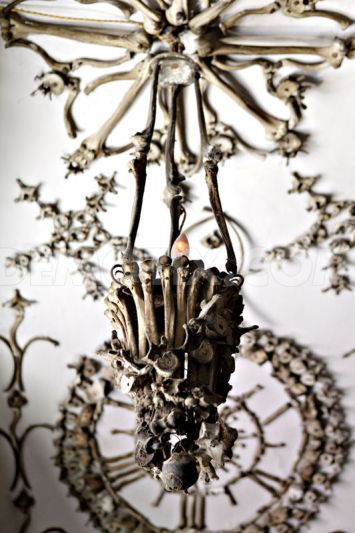Trevi fountain, the Colosseum, Michelangelo’s masterpieces, steaming cups of cappuccino, and delicious Italian food are all synonymous with Rome. But under all the glitz and glory of the Renaissance lies a dark and grim side of Rome. A place so eerie, it will send shivers down your spine and make you question reality. It’s definitely the most bizarre and spooky thing we have ever seen.
Beneath the ordinary looking church of Santa Maria Della Concezione lies the Capuchin Crypt, also known as “The Bone Church.” Skulls and bones of 4000 Capuchin monks who died between 1500 – 1870 are transformed into the most unusual artistic memorial ever created. Chandeliers, archways, and various mosaics made from these bones adorn the walls and ceilings of six underground rooms. We wonder which twisted genius thought of this idea of paying homage to the dead by turning their remains into art. It’s speculated that it’s the work of a french Capuchin friar who sought refuge in the church during the french revolution. It’s also rumored that an artist turned criminal took refuge in the convent and turned these bones into a surreal reminder of death.
Let’s get exploring! Beware this post comes with a healthy dose of goosebumps!
As you walk down the stairs and enter the dimly lit basement you instantly feel a churn in your stomach. The sight of the first room – The Crypt of Resurrection sets the mood. It features a painting of Christ raising Lazarus from the dead symbolizing the idea that death is only the beginning of an eternal life. Skulls, femurs and pelvises decorate this room from floor to ceiling to create a startling first impression.
 A chandelier made from vertebrae and sacral bones hangs in the passage along the rooms.
A chandelier made from vertebrae and sacral bones hangs in the passage along the rooms.
 Notice the intricate design on the ceiling. There’s a winged hourglass made of tiny bones and shoulder blades enclosed by skulls in the center which represents our fleeting time on earth.
Notice the intricate design on the ceiling. There’s a winged hourglass made of tiny bones and shoulder blades enclosed by skulls in the center which represents our fleeting time on earth.
 Ribs, vertebrae and leg bones create a creepy cool ceiling design
Ribs, vertebrae and leg bones create a creepy cool ceiling design
 Crypt of the Pelvises – a winged skull or a coat of arms?
Crypt of the Pelvises – a winged skull or a coat of arms?
 Pelvis art on the ceiling – rosettes, stars and other geometric shapes
Pelvis art on the ceiling – rosettes, stars and other geometric shapes
 Some skeletons still have traces of decomposing body tissue – Ewww!
Some skeletons still have traces of decomposing body tissue – Ewww!
The last room certainly has the most impact. It features three small skeletons of children resting on a pile of pelvis bones. This is a reminder that death chooses no age and can come to anyone at anytime. There’s also a grim reaper nailed to the ceiling which adds to the drama.

A skeleton holds a scythe in the right hand symbolizing death and a scale in the left hand signifying the day of judgement where God weighs the good and evil deeds of man and decides their fate.
A clock is another reminder of the fleeting time ‘the living’ take for granted. For us, it was our cue to leave this creepy place. Vertebrae define the face of the clock and finger bones are used to build the roman numbers. As we turned away from the last crypt moving towards the bright happy light at the exit (which I was so looking forward to) we see a sign that reads:
“What you are now, we used to be. What we are now, you will be.”
Brilliant! What a cheerful note to leave on! We needed a nice steaming cup of Cappuccino to get over this spooky experience, oh wait! The word cappuccino comes from….you guessed it, the Capuchin friars, referring to their coffee-colored robes. Dammit! I can never look at a cappuccino the same way again.
Happy Halloween! Hope you enjoyed this post. Subscribe to our blog and like our Facebook page for more crazy travel stories.
Disclaimer: Photography is not allowed in the crypt. All images in this post are sourced from the internet.










